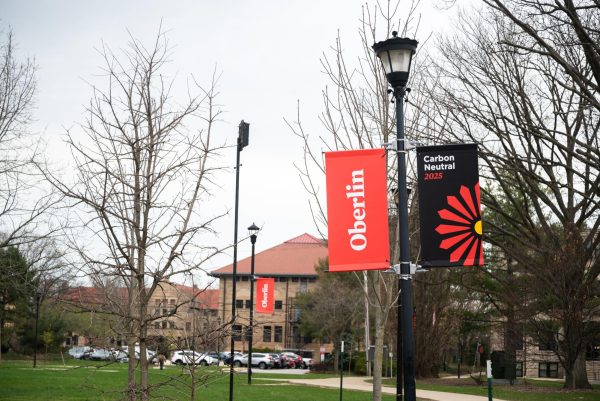Community Rallies to Support Green New Deal
Oberlin students and community members gathered at Sen. Sherrod Brown’s Cleveland office Thursday to demand that he take action against the fossil fuel industry, as well as support efforts to implement a Green New Deal, a proposed program that seeks to address climate change.
This current iteration of the Green New Deal was proposed by New York Rep. Alexandria Ocasio-Cortez, but there have been versions of the deal proposed since 2007. In addition to fighting climate change, the set of reforms included in the current Green New Deal would also seek to address economic inequality through the lens of development in clean energy and other green markets. Green New Deal policies would likely focus heavily on reworking and restoring infrastructure such as public transit systems, waste disposal systems, and even ecological systems such as wetlands. These projects would require a significant labor force, and proponents think the creation of these jobs will boost the economy and increase employment rates.
Discussions of the Green New Deal were sparked in part by the newly elected Democratic majority and recent priority shifts in the House. Oberlin’s show of support was organized by College first-year Emily Hudson, but activists are gathering to advocate for the policies in similar events across the nation. According to Hudson, the Green New Deal is a critical step that lawmakers need to take immediately.
“I think now more than ever, with the Democrats taking back the House, it’s really important that we show that the Green New Deal is something that’s really important to the people,” Hudson said. “We’ve been given this platform with all of these new progressive congressmembers where we could actually make some kind of a difference.”
As reports increasingly suggest that climate change is more serious and pressing than was previously thought, many students insist that government action has been insufficient to this point. College junior Rachael Hood, like Hudson, thinks that officials need to take action now.
“Incremental steps toward carbon reductions have never been enough and cannot be considered as a reasonable option after the release of the latest IPCC report,” Hood wrote in an email to the Review. According to her, the Green New Deal is “the kind of intense, ambitious initiative that we need to see in this country in response to climate change.”
In addition to combating climate change, some students highlighted that the policies have potential economic benefits.
“The Green New Deal is an economically sustainable way to battle climate change,” said College sophomore Ilana Foggle. “We can simultaneously have a booming economy with new jobs and ensure the sustainability of our earth.”
However, some insist that the Green New Deal is economically infeasible and potentially harmful. Colorado Congressman Doug Lamborn released a statement yesterday saying, “This nonbinding resolution makes grandiose socialistic promises of jobs for everyone, free college, and prosperity while calling for policies that we know will bankrupt our economy, destroy jobs, and destabilize the nation. It’s an irresponsible proposal that no serious person can support.”
Supporters of the Green New Deal, however, believe that this is a misinterpretation of the proposed policies.
“I think a lot of people are alarmed by the idea of a Green New Deal because they think it will take away all of these jobs,” Hudson said. “We’re not trying to take away any jobs; we’re trying to transition into still having a 100 percent job-guarantee but having them be green jobs.”
A central component of Green New Deal proposal is protections for Indigenous people and other marginalized groups who have been disproportionately impacted by climate change. Hudson explained that the event will be pushing for a particular Green New Deal that includes provisions to uphold the rights of Indigenous communities.
Hudson continued, saying that pushing for a Green New Deal will provide activists in the Oberlin community with a goal that is both tangible and achievable.
“A Green New Deal is a way to give the Oberlin student body a clear thing to push for,” said Hudson. “I think a lot of the time we know what we want is to prevent climate change, but I think a lot of people don’t totally know what that means … I think having a Green New Deal take a leading role on the ticket in upcoming elections gives people a clear sense of what they should be pushing for.”
Sen. Brown has been a proponent of fossil fuel industries in the past. However, as talk of his potential presidential candidacy in 2020 grows, many predict that he will be forced to align his energy policies with those of other progressive colleagues due to traction the Green New Deal has gained in the left-wing political sphere.
This event is another example of Oberlin students’ continuous support of climate change policies. Students have recently participated in other environmental actions, like protesting the NEXUS pipeline and raising awareness for Citizens Climate Lobby.






